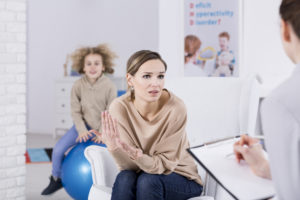When Meds Don’t Work for ADHD

When my kids were diagnosed with ADHD (one at a time, like dominoes), it was recommended that we treat with prescription medication (for them, not for me). To be honest, I wasn’t thrilled with the idea. I wasn’t sure meds would work for my young child (only 5!). Besides, I prefer to start treatment with a natural approach.
But not a single medical provider told me that meds don’t work for everyone, or that there was any treatment for ADHD other than medication in 1999. I wish I had known that behavior management training for me was recommended treatment for my kids (even back then!), and that it would have been ideal to start it before medication. In hindsight, it was the treatment my family needed most – especially because meds didn’t work for my young kids with ADHD.
Medication Was Not a Good Fit for My Young Kids
After diagnosis, I postponed medication as long as I could, trying a bunch of unproven remedies and tactics until (at age 8) my child’s academic and social challenges reached the point that we had to do something. So, we tried medication. And then tried another one. And then tried again. It felt like my child was a pharmacological experiment.
Medication did not turn out to be a good fit for my kids during their elementary years (which I’ve seen mirrored in many of my clients’ stories over the years).
Now, don’t get me wrong – medication is an effective treatment for many young kids with ADHD, and can really help to improve symptoms so that parents can help their kids learn self-management. But in my house, the side-effects ranged from tics (terrifying) to tantrums (exhausting). One med amped up anxiety, another triggered a kind of emotional intensity. At the end of the day, the benefit of medication simply did not outweigh the cost for my young kids!
So what’s a mother to do when the only treatment I’d heard about was causing more harm than good -- and nothing else seemed to work?
Article continues below...
Treatment for your Child's ADHD
Download a free tip sheet "Recommended Treatment for ADHD: Medication & Behavior Management" for what's really recommended for your child or teen.
Behavior Management Training is Recommended Treatment
There is another treatment recommended for children with ADHD besides medication: behavior therapy. "Behavior therapy has been shown to help improve symptoms in young children with ADHD and can be as effective as medicine, but without the side effects," says Anne Schuchat, MD. However, since there is a great deal of confusion (even within the medical community) about what behavior therapy is and how to find reliable providers, more often than not medical providers do not make referrals for it. Here's an NPR story that explains it pretty well.
According to the CDC website*, “Parent Training in Behavior Therapy is also known as Behavior Management Training for Parents, Parent Behavior Therapy, Behavioral Parent Training, or just Parent Training.” It focuses on training parents (and teachers) to create an environment that supports children; and it “has the most evidence of being effective.”
There is a common misconception that “Behavior Therapy” refers to a trained therapist working directly with a child. Personally, it took me a while (um, true confession: years!) to understand that behavior therapy is not the same thing as putting a child into therapy.
HealthyChildren.org clarifies:
"Behavior therapy should be differentiated from psychological interventions directed to the child/adolescent and designed to change the child’s/adolescent’s emotional status (eg. play therapy) or thought patterns (eg. interpersonal talk therapy).
These psychological interventions do not have a demonstrated efficacy for the ADHD core symptoms, and gains achieved in the treatment setting usually do not transfer into the classroom or home. By contrast, parent training in behavior therapy and classroom behavior interventions have successfully changed the behavior of children/adolescents with ADHD."
In simpler terms, working with a therapist can help kids and teens with co-existing anxiety and depression; but research shows that traditional therapy does not generally address the underlying behavioral management challenges of ADHD.
Behavior Therapy Should Start Before Medication
Dr. William Pelham maintains that parent training using behavioral strategies “is the only therapy that works,” particularly for young children. In May, 2016, in a webinar titled, “More Than Meds: A Parent’s Guide to Using Behavior Therapy,” Dr. Pelham said, “Teaching parenting skills is the single most effective and important intervention for treating kids with ADHD.” He continued, “There’s no therapy that a therapist can do in their office with a child who has ADHD that will have any impact on that child’s behavior.”
Behavior therapy is an important first step for parents because:
- It provides skills and strategies for parents to help their kids.
- It has been shown to work as well as medication for ADHD in young children.
- Young children have more side effects from ADHD medications than older children.
- The long-term effects of ADHD medications on young children have not been well-studied.
According to the CDC, “Behavior therapy, given by parents and with the support of healthcare providers, teaches children to better control their own behavior, leading to improved functioning at school, home and in relationships.” The CDC explains that when parents learn and practice behavior therapy, it “requires time and effort, but it has lasting benefits for the child.”
To find out more – about medical protocols, the purpose of behavior therapy, and who delivers it – read What is Recommended Treatment for ADHD.

